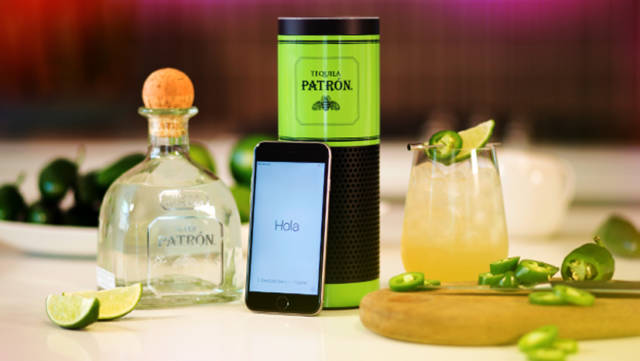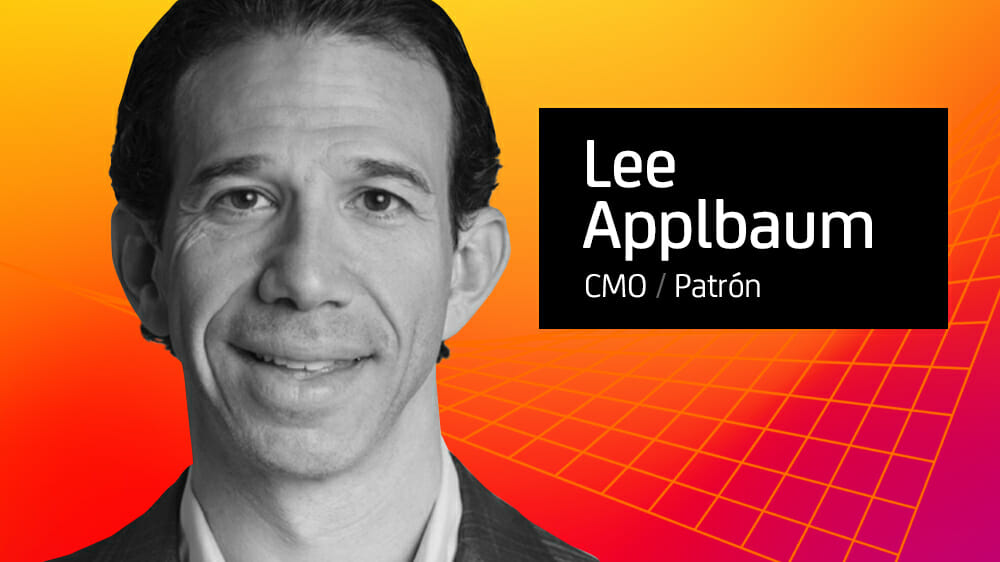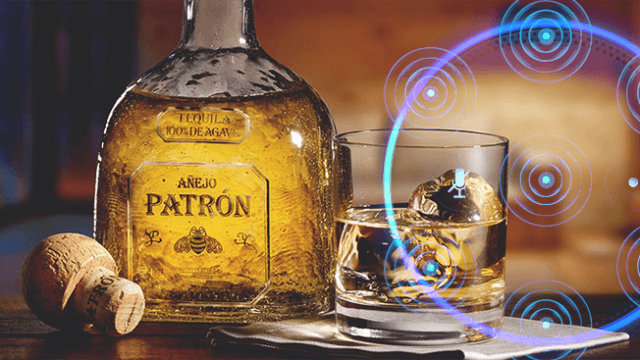Patrón became the first spirits brand to take a shot at voice marketing last year by debuting a Cocktail Lab on the Amazon Alexa platform.
For the tequila maker, the innovation wasn’t necessarily made to feed the bottom line, but to be a marketing vehicle to better cohabitate with consumers—all while digitally serving over 150 cocktail recipes.
In an interview with AListDaily, Lee Applbaum, Patrón’s global chief marketing officer, said the Cocktail Lab activation isn’t an above-the-line, traditional play but more of an obligation to invest in tech no matter the ROI it generates because that’s how consumers are increasingly interacting with brands today.
It’s all part of the technology-and-tequila-infused, long-marketing game Applbaum and the brand he oversees is playing. In the past, Patrón has used virtual reality to take users to their private distillery in Jalisco, Mexico, experimented with augmented reality by releasing an ARKit app for the iPhone and iPad, debuted a chatbot-tender on Twitter as well as partnered with director Guillermo del Toro for video shorts.
After Patrón’s first pour in the space, alcohol brands like Johnnie Walker and Jim Beam have dedicated budgets to voice marketing and jumped into the AI-driven conversation, somewhat hinting at a paradigm shift across the core foursome of voice-controlled digital assistants in Apple’s Siri, Google Assistant, Microsoft’s Cortana and Amazon’s Alexa (with Echo devices now sold at Whole Foods).
Adoption for voice-enabled smart speakers—and by default, it serving as a gateway to tech-enhanced shopping—is seemingly around the corner. According to Edison Research, 40 percent of smart-speaker owners reported that the device had a major impact on their lives and 42 percent claimed to have purchased multiple. Juniper Research reports that by 2022, 55 percent of American households will have smart devices.
AListDaily caught up with Applbaum to see how voice fits into Patrón’s overall marketing strategy and why it completes the lifecycle for the stories they’re trying to tell as a brand.
How did you design your voice marketing strategy? What’s Patrón’s end game in the space?
The Cocktail Lab wasn’t done for marketing’s sake. It wasn’t done to generate earned media or to be clever. Like all of our investments in technology and innovation, voice activation and control through Cocktail Lab was done as a means to an end, rather than an end in and of itself. By that, I mean technology isn’t necessarily a part of a tequila distillery’s arena. We’re not a Silicon Valley player. We don’t have the need to showcase tech in the same way that other brands do. The decision to leverage Amazon Echo and Alexa was really driven by consumer trends and consumer need.
We talk a lot about cohabitating with our consumers. The way that we better serve them as a brand [by ensuring we’re] as conveniently accessible as possible. Whether it’s at a bar, restaurant or spirits store, that access directly comes through the purchase of the product. Either before they make that purchase decision, or after the purchase decision, we’re thinking a lot about how can consumers engage with our brand.
In the case of Cocktail Lab, we want to leverage a cocktail-selection, recipe-development tool in a way that brings balance to their lives. We don’t expect them to change the trajectory of their life because of Patrón. Whether it’s Siri, Amazon Echo or Cortana, that is how consumers are increasingly engaging with content and getting information. It’s sort of a requirement for us to cohabitate with consumers and make accessibility of content done in a way that is balanced.

How have you been measuring the effectiveness and success of your voice activation?
The beauty of the digital ecosystem is the ability to track hard metrics. You can look at engagements and usage—whether or not those engagements generate a direct positive ROI is very difficult to measure, to be candid with you. But as with everything with Patrón, we’re always playing the long game. When you think about this platform investment, it’s not some ephemeral marketing ploy that you expect to hit and move on.
For Patrón, Echo, Siri and the like are at the forefront. It’s not going to be a flash in the pan. It’s going to be the way that we engage with technology. We’re a little less predictable on the platform than others. ROI may ultimately be important because we still need to sell tequila, but the fact is that we have an obligation to invest in these technologies no matter the ROI it generates because that’s how our consumers increasingly interact with brands.
That’s not a way of talking around saying, “it’s lackluster.” The fact of the matter is that in over the last year, it exceeded our expectations in every way and dimension. That would include hard engagement numbers, which we obviously don’t share the specifics of. We’re not naïve in terms of the value that we also get from the incredible PR and support Amazon offered us. To have a high-profile brand like Patrón with voice-activated marketing, it’s as much a win for us as it is for Amazon. They’ve done a really nice job of showcasing us. I am confident that in the near term we achieved our goals and objectives, and in the long term, this isn’t something we’re just going to do and then move on. As voice itself evolves, along with the technology platform evolution, we will evolve with it because this isn’t just a nifty gimmick. The thought of interacting with voice is something that will become part of our everyday lives.
What are the KPIs you’re attaching to voice-based marketing and Patron Alexa Cocktail Lab?
It’s very difficult to track all the way back to sales. We have partners like Reserve Bar, who do online spirits sales, where you can track it back, but at the scale of which we operate, trying to derive a legitimate ROI at the bottle or drink sales level is virtually impossible. What we look at is consumer engagements—how many consumers are actually using the Alexa tool, the cocktails they’re searching for, how much time they’re spending searching for them.
When you think about the “r” in ROI, “return” has to ultimately be a financial one, which is a bit trickier to get at. But there are a lot of returns in terms rich data that is exciting and insightful. There are nice little earned-media outcomes from conversations that reflect on the spirit of innovation for our company.
We’re monitoring trends like: are consumers asking for spicy, sweet, sour or classic cocktails? What time of day are they engaging with the platform? Are they doing it at 5 o’clock? Or are they interacting in the morning—not when they’re drinking, necessarily, but when they’re thinking about the kinds of ingredients that they may need to purchase later in the day. The richness of the data is invaluable and it’s real-time data, which better informs the way we can market to consumers outside of the voice ecosystem. We can then think about how this might affect other digital assets and the content with which we communicate with consumers.
Do you strongly believe there is a future in voice marketing?
The nuances and frustrations with voice that we have today are almost laughable. There are people a lot smarter than me working on this sort of stuff to become much more natural, obviously supplanting all of this with AI. Clearly, it’s still nascent. There’s no question in my mind that when done right, voice makes everything easier. I think it’s unquestionable that it’s here to stay. It’s going to get exponentially better and faster. The fat fingers will go away, and we can have a natural conversation with whatever platform it is.
I think in the case of culinary mixology, there’s also a practical purpose. If I’m dealing with limes and salt and cutting and cooking things, it makes things easier. It’s something that every household will have in their hands. We’re a ubiquitous brand, and this is a ubiquitous technology. Even if it is a bit nascent, we need to be in it. We don’t want to be last to the game. We want to use this time, along with our technology partners, to figure it out.
How are you handling data and security concerns?
I’m not perhaps as alarmed about it as maybe others are. We do everything possible to protect our user data, and one would argue that knowing that you like a spicy jalapeno margarita is probably a little less risky than, say, knowing your pin code, your social security number or your blood type. We count on our technology partners to invest in the systems that protect user data. We don’t sell it, we don’t share it, we don’t syndicate it—ever. We’re not taking it lightly that you’re sharing your preferences with us. We’re going to be very, very careful about protecting that privacy.
The truth is that real, rich data resides with Apple and Amazon. I don’t think we naively trust them, but we do partner with those who have established networks of trust. Nothing is foolproof, and any time that you make a decision to be an innovator, you risk yourself to some potential degree of exposure.
Why is tech innovation for your tequila brand important?
To be quite candid, in general, the spirits industry isn’t generally the most innovative with technology. It’s why I’m so proud of the work that my team does because we really are leaders in that regard. We’re all constrained for time and are finding ways to effectively multitask. Innovation just opens another window for us to get something done a little bit easier.
There are brands who innovate as gimmicks and marketing ploys, and there’s nothing wrong with that—I’m not against a clever marketing play. But you really have to go back to the ethos of your brand. Ours is about cohabitating with our consumer and making Patrón spirits as accessible as possible, and voice brings that accessibility one step closer.


